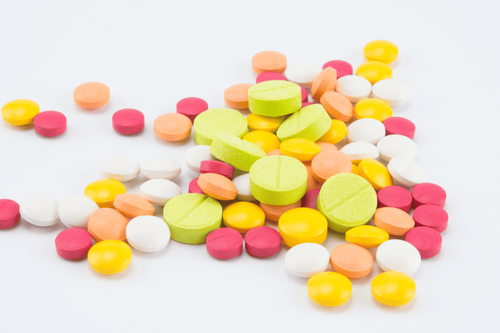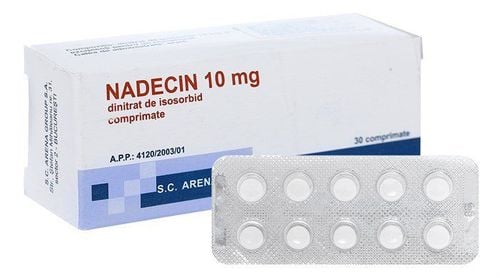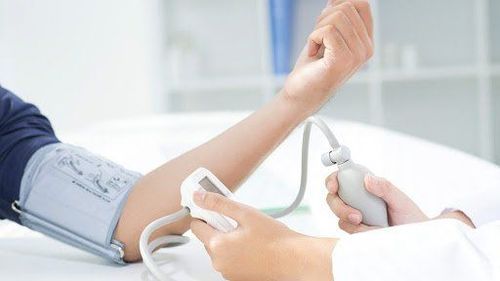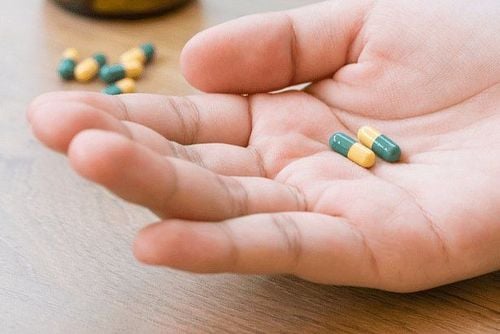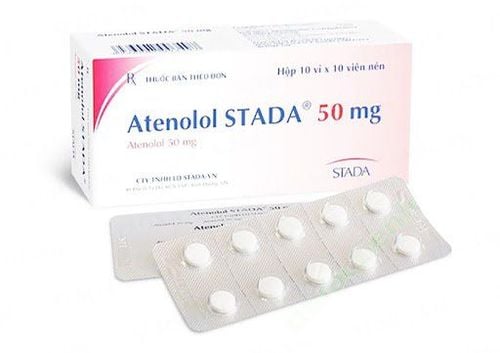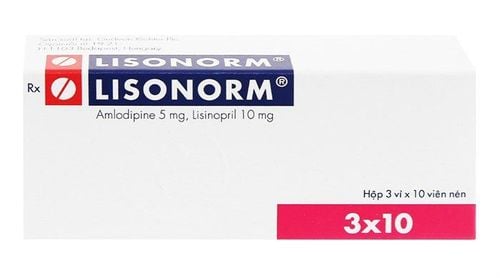This is an automatically translated article.
Along with the increase in age, the human body has many physiological and pathological changes. In the elderly, physiological changes are the aging of organs in the body. The law of aging in old age takes place asynchronously and at the same age, leading to difficulties in the use of drugs in the elderly. Chronic lesions from life-long pathological processes are responsible for altered drug response at this age. Therefore, the use of drugs for the elderly needs its own principles and precautions.
1. How does the pharmacokinetics of drugs in the elderly change?
Being 60 years of age or older is considered elderly. This is the period when the pharmacokinetic changes are mainly related to the decrease in blood flow to the body organs, leading to a decrease in the nourishment of the organs in the body, this is the origin of the disease. age-related diseases. Changes in pharmacokinetics are one of the factors affecting drug use in the elderly.
1.1. Drug absorption
In the elderly, the physiological functions of the digestive system are reduced:
The rate of gastric emptying decreases: The slow emptying of the stomach increases the retention time of the drug in the stomach, thereby may lead to increased destruction of unstable drugs in acidic environment such as ampicillin, erythromycin... or slow down the action rate of enteric-coated drugs, increasing the possibility of irritation and gastric ulcer of the patient. non-steroidal anti-inflammatory drugs (NSAIDs). In the elderly, the ability to secrete HCl in the stomach is reduced, leading to an increase in gastric pH compared to young people. As a result, the bioavailability of drugs that are weakly acidic or weakly basic is altered. Reduced surface absorptive area: Decreased blood flow and surface absorptive area in the small intestine, along with aging of the intestinal mucosa, cause the absorption of drugs to be absorbed by the transport mechanism. positive as calcium, iron, vitamins, amino acids... are reduced. Muscle mass and organ perfusion are impaired in the elderly, leading to decreased and unstable intramuscular absorption. As the age increases, the skin becomes dry, the lipid composition decreases, making it difficult to absorb drugs, so drug absorption through the skin decreases. Thus, the effectiveness of drug use in the elderly by all routes of drug delivery (except intravenous) tends to be reduced compared to that in adulthood.
1.2. Drug distribution
The aging of the body's organs is the cause affecting the distribution of drugs in the elderly, which can include the following factors:
Decreased cardiac output Decreased plasma albumin: Decreased protein plasma which is mainly albumin as a result of impaired liver function leading to an increase in free drug (increased pharmacological and toxicological effects), this is often the case with cardiovascular drugs used in the elderly. age such as furosemide, warfarin... Loss of muscle mass Decrease of body water: The amount of water in the body decreases, reducing the volume of distribution of water-soluble drugs such as digoxin, lithium, morphine leading to increased blood concentration. and tissue. Drugs that bind strongly to tissues such as digoxin will prolong their action and stay in the body. Increase the amount of lipids in the body: Increasing the amount of lipids in the body increases, leading to an increase in the volume of distribution of fat-soluble drugs such as barbiturates, diazepam, thiopentan... thereby prolonging the duration of action and causing drug accumulation. in adipose tissues.
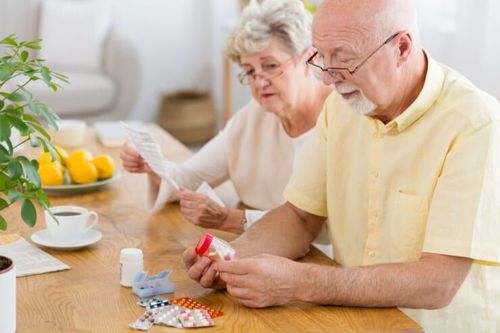
Chuyển hóa thuốc tại gan ảnh hưởng nhiều đến việc sử dụng thuốc ở người cao tuổi
1.3. Drug metabolism in the liver
Drug metabolism in the liver greatly affects the use of drugs in the elderly. The factors affecting the drug metabolism in the liver of the elderly are as follows:
Decrease in liver volume: In the elderly, the liver volume and blood flow through the liver decrease to only 55 - 66% compared to the normal age. youth age. This makes drugs metabolized by the liver have a longer duration of action, easy to accumulate and cause toxicity. Decreased activity of drug-metabolizing enzymes: The activity of drug-metabolizing enzymes in the liver is reduced, leading to a decrease in drug destruction in phase I. Therefore, drugs metabolized mainly by this pathway such as drugs Anti-convulsants, non-steroidal anti-inflammatory drugs, oral anticoagulants, diabetes drugs used in the elderly will prolong their existence in the body. Decreased hepatic blood flow: Drugs that are extensively metabolised in the first circulation through the liver have the potential to increase bioavailability due to decreased hepatic enzyme activity, decreased hepatic blood flow, and decreased liver mass. Several drugs have been shown to reduce first-pass metabolism, such as labetalol, nifedipine, nitrates, verapamil, propranolol, and chlormethiazol. In fact, in clinical practice, the drug is extensively metabolized by the liver when used in the elderly, so the dose should be reduced by 1/2 - 1/3 and must be closely monitored during treatment.
1.4. Elimination of drugs by the kidneys
In the elderly, aging changes of the excretory organs include:
Decreased renal blood flow: The decline in renal function combined with decreased renal blood flow in the elderly is the cause of reduced clearance in many drugs. Decreased glomerular filtration rate: The glomerular filtration rate decreases on average by about 35% compared to the young age. This is especially important for drugs that are excreted more than 60% intact by the kidneys and are highly toxic such as cephalosporin antibiotics, aminosides, digoxin, methotrexate... Decreased renal tubular secretion Decreased renal mass In elderly patients with renal function still above 67%, no dose adjustment is required because the pharmacokinetic parameters are not significantly changed. Conversely, if renal function impairment is severe, the dose must be adjusted as in the case of patients with renal failure. Changes in renal function are very variable in the elderly, so an appropriate dose adjustment is required for each individual patient based on creatinine clearance.
Watch now: Note when using pain relievers in the elderly
2. Drug-induced risks in the elderly
Precisely because of changes in physiological function and deterioration of body organs, the use of drugs in the elderly may cause the following risks:
Sleep disorders: Some medications Treatment in the elderly causing sleep disorders such as diuretics (nocturia causes insomnia), bronchodilators, corticosteroids (long-term use can cause sleep apnea). Orthostatic hypotension: Postural hypotension causes dizziness, dizziness when changing positions, so it is extremely dangerous in the elderly. Certain medications cause this condition, such as antihypertensive drugs, H1 antihistamines (Chlopheniramine), and Parkinson's medications. Cognitive disorders: Cognitive disorders when using drugs in the elderly are often confused with intellectual impairment. Some medications cause confusion, forgetfulness, and temporary memory loss as side effects, such as high blood pressure medications, anticonvulsants (phenytoin, barbiturates) or even some classes of antibiotics. Loss of balance or easy to fall: This situation is very dangerous for the elderly because at this time the musculoskeletal system is no longer solid (calcium deficiency, osteoporosis) so it is easy to lead to fractures. Some drugs cause imbalance side effects when used such as antihypertensive drugs (causing orthostatic hypotension), antidepressants, benzodiazepine tranquilizers (disturbing the balance of the body). ). Hypothermia: As age increases, body temperature regulation decreases. Therefore, caution should be exercised when using drugs that cause side effects of hypothermia in the elderly such as opioid analgesics (morphine, codeine, tramadol, proprapamine)... Sexual dysfunction: Same With increasing age, the long-term use of certain drugs can lead to sexual dysfunction such as antihypertensive drugs (reserpine, methyldopa, β-channel blockers), antidepressants , cardiovascular drugs used for the elderly.

Một số thuốc điều trị ở người cao tuổi gây ra tình trạng rối loạn giấc ngủ
3. Medical conditions affecting drug use in the elderly
Multiple medical conditions leading to dysfunction of many organs in the body and this affects the use of drugs in the elderly. Common disorders are as follows:
Gastrointestinal disorders (constipation): This condition causes many elderly people to regularly use laxatives, leading to reduced absorption of concomitant drugs. Memory loss: Leads to forgetting to take medication, confusion about medication and dosage. Poor eyesight: Causes poor reading of prescriptions or misreading of drug names. Tremor: Leads to difficulty in counting drops when taking the dropper form, or awkwardness when encountering difficult-to-open bottles. Like to abuse drugs: Elderly people often tend to take drugs for longer than the prescribed time due to fear of illness. Osteoporosis: Osteoporosis makes elderly people afraid to exercise due to pain and often tend to lie down even when taking drugs, so they are prone to ulcers of the esophagus and stomach with strong irritating drugs. Decreased thirst due to decreased thirst reflex in the elderly, so the elderly often drink less water, the amount of water added to the body is not enough, increasing the possibility of drug deposition in the kidneys causing kidney stones (drugs such as sulphonamides, high dose vitamin C, sulphonamides...). Watch now: Note when using drugs to treat mental disorders in the elderly
4. Principles of drug use in the elderly
Treatment of the elderly is a complex process due to uneven aging with age and varying response from patient to patient. In order to improve treatment effectiveness and limit unwanted effects when using drugs in the elderly, it is necessary to adhere to a number of principles as follows:
Limit the use of drugs if not really necessary, choose a treatment regimen simple treatment, as little drug as possible, avoid drugs with high risk of interactions such as antacids, cimetidine, erythromycin... Consider the effect of treatment on quality of life: Treatment goals for the elderly Age does not simply prolong life but also improve the quality of life. Treat the cause, not just the symptoms: For each patient, every effort should be made to find the real disease and to provide specific treatment. Drug history: It is necessary to have complete information about the patient's medications and medications to avoid allergic reactions, possible serious drug interactions, drugs used but not responding well... Comorbidities: The elderly are susceptible to diseases such as liver failure, kidney failure, heart failure, etc., which increase the risk of adverse drug effects in patients. Choosing the right drug: Just like in any other subject, the elderly need to be treated with the most effective drug, with the fewest side effects and suitable for the patient's condition. Dose adjustment: Elderly patients should be treated with a new drug starting with the lowest possible dose and frequency of administration, then titrated up as needed. In general, the elderly need a lower dose than the younger age group. Dosage form: Elderly patients are more suitable to use syrup, suspension, and effervescent tablets than tablets. Choose medicines with easy-to-open packaging, large and easy-to-read labels. It should be noted that undesirable effects (ADRs) and drug interactions may occur, because elderly patients are immunocompromised, many comorbidities have to take many drugs at the same time, so it is easy to encounter drug and drug interactions. unwanted use of the drug. It is necessary to closely monitor symptoms that may be caused by drugs in elderly patients such as constipation, confusion, depression, orthostatic hypotension, hypothermia, etc. Instruct the patient to use the drug. by writing clear, easy-to-read instructions for drug use to increase compliance with treatment. Thus, the elderly are prone to many diseases at the same time and most of them are chronic diseases, so they often have to take many drugs at the same time, leading to an increased risk of unwanted effects and interactions. medicine. Therefore, it is necessary to pay attention to the selection of drugs, appropriate doses and consider the impact of the treatment process on the patient's quality of life.
Vinmec International General Hospital is a high-quality medical care address with a team of doctors and pharmacists with many years of experience and good expertise. When having health problems, customers can contact the hospital to be examined and have the best indications for taking medicine.
Please dial HOTLINE for more information or register for an appointment HERE. Download MyVinmec app to make appointments faster and to manage your bookings easily.




